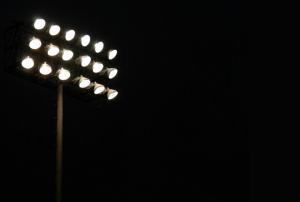May 24, 1935: FDR pressed a gold telegraph key, and Crosley Field’s eight light towers turned on night baseball.
Steve Mitnick is Editor-in-Chief of Public Utilities Fortnightly and author of the book “Lines Down: How We Pay, Use, Value Grid Electricity Amid the Storm.”
You're at Crosley Field. It's May 24, 1935. The home team Cincinnati Reds will play the Phillies of Philadelphia.

Both teams were bad. The Reds finished thirty one and a half games behind the first place Chicago Cubs, and the Phillies thirty five and a half games back. Naturally, the Cubs lost the World Series that year.
No matter to the over twenty thousand present to witness history. Ten times average weekday attendance.
The Reds first baseman later said, "No pun intended, but there was electricity in the air. On the field, in the stands, and in the dugout." From the White House, President Franklin Roosevelt pressed a gold telegraph key, and Crosley Field's eight light towers turned on night baseball.
General Electric and Cincinnati Gas & Electric (now Duke Energy) designed and installed the light towers. Engineers painstakingly determined the tower positions. A Cincinnati Enquirer reporter wrote: "The theory that the players cannot see the ball well under the lights was shot to pieces by staging of some of the finest defensive plays seen here this season."
Another Enquirer reporter wrote this poetry: "What clouds there were were so thin that the ball, when it flew high, shone through them like a bald head in a steam room. And when there was no mist, the sphere stood out against the sky like a pearl against dark velvet."
By 1948, all the major league teams played night games in their home parks, except the Chicago Cubs. The Detroit Tigers, New York Yankees and Boston Red Sox were the only other holdouts until the post war period.
The first Cubs game at the Cubs' Wrigley Field played under lights took place in 1988. Though Wrigley was installing light towers for the 1942 season. But Pearl Harbor was attacked. The very next day, the Cubs instead donated the steel to the war effort.
Electrical baseball even had a hand in the integration of the majors. The early 1930's were hard times for the whole country, including the negro leagues. One team went bankrupt, then the league disbanded. The Kansas City Monarchs were desperate to attract fans.
To survive, the Monarchs innovated. They built six floodlights on telescoping poles, and drove them from stadium to stadium on flatbed trucks. Attendance doubled, then tripled. Fans could see a game after work. And enjoy the new experience of electricity, when many didn't have electric service at home.
A few years later, a young shortstop got his start with the Monarchs. Jackie Robinson later played for the Brooklyn Dodgers, integrating the majors in 1947.
A ridiculous but oft-repeated rumor concerns Cal Ripken Jr., Kevin Costner, and the cancelled Orioles-Mariners game of August 14, 1997. A ground fault interrupt tripped the circuit breaker whenever the right-field lights were turned on at the Orioles' Camden Yards. An hour past game time, twenty bulbs still wouldn't glow.
An especially serious problem since Mariners fireballing lefty Randy Johnson was to pitch that night. His pitches would come from the stadium's shadowy side. At ten, the umpires had enough, and called the game.
The cancellation came amid Cal's remarkable consecutive games streak. The rumor claims the Orioles owner intentionally disrupted the lights to preserve Cal's streak (and fan interest).
Cal supposedly couldn't play that night since he had fought with Kevin Costner, a good friend since the actor's premiere of Dances with Wolves. Cal and Costner fought, it was said, over Cal's wife.
Years later, Cal told National Public Radio, "I was definitely there. I was ready to play." And an angry Costner once called into a Fox Sports Radio show. "I was going to take your heads off," if the radio personalities ever said the rumor was true.
One of the all-time greats, Ty Cobb was constantly enmeshed in controversies of his own making. In the Hall of Fame's inaugural class, Cobb outpolled Babe Ruth, Walter Johnson, Christy Matthewson and Honus Wagner. But he was mean and violent on the field and more so off it.
His last months battling cancer, in 1961, were spent on painkillers and scotch in his Atherton, California mansion. Without electricity. Off the grid.
The Georgia Peach was in yet another fight, perhaps his last. About his minor billing dispute with Pacific Gas & Electric, Cobb said: "When I wouldn't pay, they cut off my utilities. Okay. I'll see them in court."
Lead image © Can Stock Photo Inc. / mrdoomits


